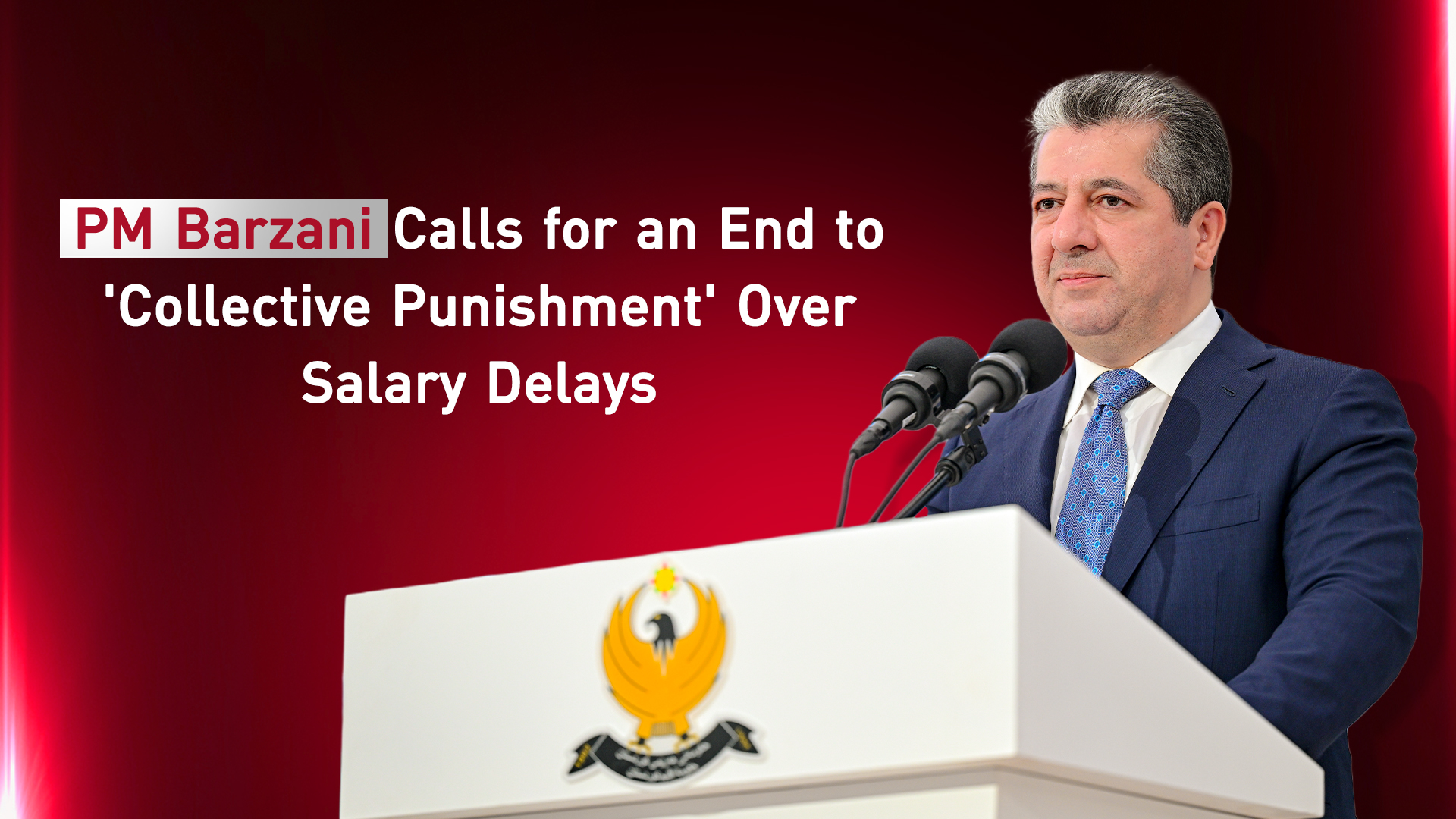'We Will Not Give Up Our Constitutional Rights,' Says PM Barzani
PM Masrour Barzani blamed Baghdad and some political parties for the salary crisis, revealing he agreed to a new oil-revenue deal that was derailed by drone attacks and shifting demands. He urged Baghdad to stop the "collective punishment" and respect the Kurdistan Region's constitutional rights.

By Kamaran Aziz
ERBIL (Kurdistan 24) – Prime Minister Masrour Barzani on Sunday delivered a frank and detailed account of the ongoing salary crisis, revealing he had personally agreed to a new oil-and-revenue-for-salaries deal with Baghdad, only for the federal government to create new "excuses" and conditions complicated by recent drone attacks on the Region’s oil fields.
In a direct address to the citizens of the Kurdistan Region during the inauguration of the Erbil Emergency Rapid Water Project, the Prime Minister laid bare the KRG's position, placing blame on both internal political parties for initiating the crisis and on the federal government for perpetuating it through a cycle of broken promises and what he termed "collective punishment."
"I know the people of Kurdistan are waiting to know when their salaries will be sent from Iraq. Here, I want to speak frankly with the people of Kurdistan," the Prime Minister began, setting the stage for an unvarnished explanation of the protracted dispute.
He asserted the Kurdistan Region's constitutional right to manage its own budget as a federal entity. However, he stated that this right was undermined from within. "Unfortunately, it was internal parties here who filed complaints and demanded that Baghdad directly interfere in the affairs of distributing the budget and salaries of the Region," he said.
Prime Minister Barzani challenged those parties directly, recalling their previous assurances to the public. "They said that if salaries were returned to Baghdad, we would no longer have a problem with non-payment... At that time, they blamed the KRG and said the Iraqi government was the solution and the savior," he recounted. "I don't know where those voices are now. Why are they silent? And if they speak now, they make excuses for why the Iraqi government is not currently sending salaries, and why it is punishing the people."
He described a frustrating pattern of negotiations, where repeated KRG delegations to Baghdad would secure promises of a resolution, only for new delays to emerge. "It wouldn't last a month or two before a new excuse would delay the salaries again," he said, noting that justifications would shift from "technical problems" to accusations that the KRG was not handing over oil or revenue.
The Prime Minister firmly stated the KRG's adherence to the constitution regarding revenues. "Our understanding of handing over internal revenue is according to the constitution. The constitution says 50% of federal revenues [collected in the region] should be handed over to the federal government," he explained, adding that the KRG has always fulfilled this duty except when Baghdad's failure to send salaries forced them to use internal funds to supplement payroll.
He characterized Baghdad’s demands as an attempt to strip the Region of its autonomy. "They say you shouldn't have any kind of revenue at all... 'Hand over everything you have to us,' so that we cannot implement these kinds of projects," he stated. "But we have a constitution, and we have constitutional rights... we are not prepared to relinquish our constitutional rights."
The Prime Minister then revealed the specifics of the most recent high-stakes negotiation, which involved a joint delegation from the Kurdistan Democratic Party (KDP) and the Patriotic Union of Kurdistan (PUK). He recounted a direct phone call with PUK President Bafel Talabani and Iraqi Foreign Minister Fuad Hussein, who presented him with a final proposal from Baghdad.
"They said, 'We have had intensive discussions with all parties on this proposal... we would like you to agree to this deal so that no one has any more excuses, and these people can be relieved of this pressure,'" the Prime Minister recalled. "I said, 'Okay, on my honor, I agree to hand over 230,000 barrels of oil to the federal government to be sold through SOMO, and to hand over 120 billion dinars of non-oil or internal revenue to the federal government.'"
However, this agreement was immediately complicated by external events and a new condition from Baghdad. "We accepted the duties that were upon us, but that was also concurrent with the attacks on the oil fields via drones," he said. He explained that he raised the issue that the drone attacks would reduce the available oil for export, expressing his hope this would not become another excuse.
"After we agreed to the deal and signed the proposals based on that understanding, they added another point... The point that salaries will not be paid until the 230,000 barrels are received," he revealed, highlighting the impossible situation. "On the other hand, those terrorists come and blow up our fields and stop oil production. Well, how can it be done?"
He confirmed that a federal delegation visited the fields to assess the damage and submitted its report to Baghdad on Saturday, confirming that only a limited amount of oil is currently available.
Concluding his detailed explanation, Prime Minister Barzani put the onus squarely back on the federal government. "We are now waiting for Baghdad, and we hope they will finally send the salaries of these people, and that this collective punishment will end, and this unconstitutional and illegal decision to cut the salaries of the people of Kurdistan will end."